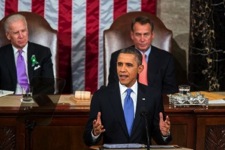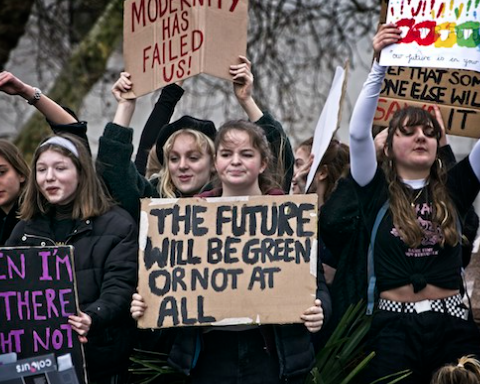By: Darrian Stacy
“We must all do our part to make sure our God-given rights are protected here at home. That includes our most fundamental right as citizens: the right to vote. When any American—no matter where they live or what their party—are denied that right because they can’t afford to wait for five, six, seven hours just to cast their ballot, we are betraying our ideals. So, tonight, I’m announcing a non-partisan commission to improve the voting experience in America…”
In his Tuesday night State of the Union Address, the President once again argued for the need of voting reform to prevent long lines at the polls. This marks the third time in four months that Obama has advocated the issue to the American public while being televised nationally. This time however, the President is offering real action behind his words.
In his address President Obama announced the creation of a “non-partisan commission” headed by Ben Ginsberg, who served as National Counsel for the Romney campaign, and Bob Bauer, who served as General Counsel for the Obama campaign. At the President Obama’s direction the commission will work to “develop recommendations for state and local election officials to reduce waiting times at the polls and improve all citizens’ voting experience.”
While there are a myriad of complex issues associated with voting reform, some things that the commission must inevitably address include:
Voter Identification– A study by the Brennan Center for Justice in 2006 indicates that stringent State voter identification laws not only disenfranchise as many as 10 percent of all eligible voters, but also “fall hardest on people who have traditionally faced barriers at the polls” like low-income citizens, those with disabilities, and the elderly. Such laws, “[un]justified by any serious or widespread problem” also create administrative problems at the polls and contribute to the long lines the President mentioned in his State of the Union address. Contrary to the Brennan Center for Justice’s study and others like it, 12 states have passed new voter identification laws between 2011 and 2012 alone. These laws work in direct competition to the President’s goal of making voting easier and to “improve all citizens’ voting experience.”
Voter Registration– Unregistered voters who attempt to vote also contribute to the problem of long lines. In America when an election is in full swing numerous third-party organizations submit millions of voter registration forms. Very often such forms are inaccurate, inconsistent or incomplete, and poll officials must direct resources to handle these situations. Adding to the problem is local officials who must deal with these problems with antiquated technologies and voter rolls filled with unreliable information. This particular problem not only causes problems during election day, but also, as one study indicates, significantly raises the price taxpayers are paying to maintain current voting registration lists (On average local election offices spend about one-third of their total budget on voter registration).
Early Voting– Perhaps the most dramatic issue with long voting lines in 2012 centered on early voting. In two important battleground states, Ohio and Florida, battles were waged between Republicans attempting to limit the number of early voting days, and Democrats who opposed the measures. In Ohio, Democrats ultimately won the fight to keep early voting during the days leading up to the election. In Florida however, Republicans were victorious in cutting early voting days from 14 to 8. While both states still had cases of long voting lines on Election Day, Florida faced many more problems than Ohio, causing Governor Rick Scott to reverse his previous position on limiting early voting days.
These issues are not the only problems that need to be addressed if voting reform is to be effective. They do however highlight the biggest obstacle the President faces in promoting the issue: determining the line where federal authority ends and state and local control begin. With Republican legislators like Senator Ted Cruz already criticizing the president for “focus[ing] on partisan advantage for the Democratic Party,” expanding federal influence over elections will be difficult for Democrats to pitch. At least however, the President has now repeatedly demonstrated his willingness to address the issue despite the challenges ahead.

